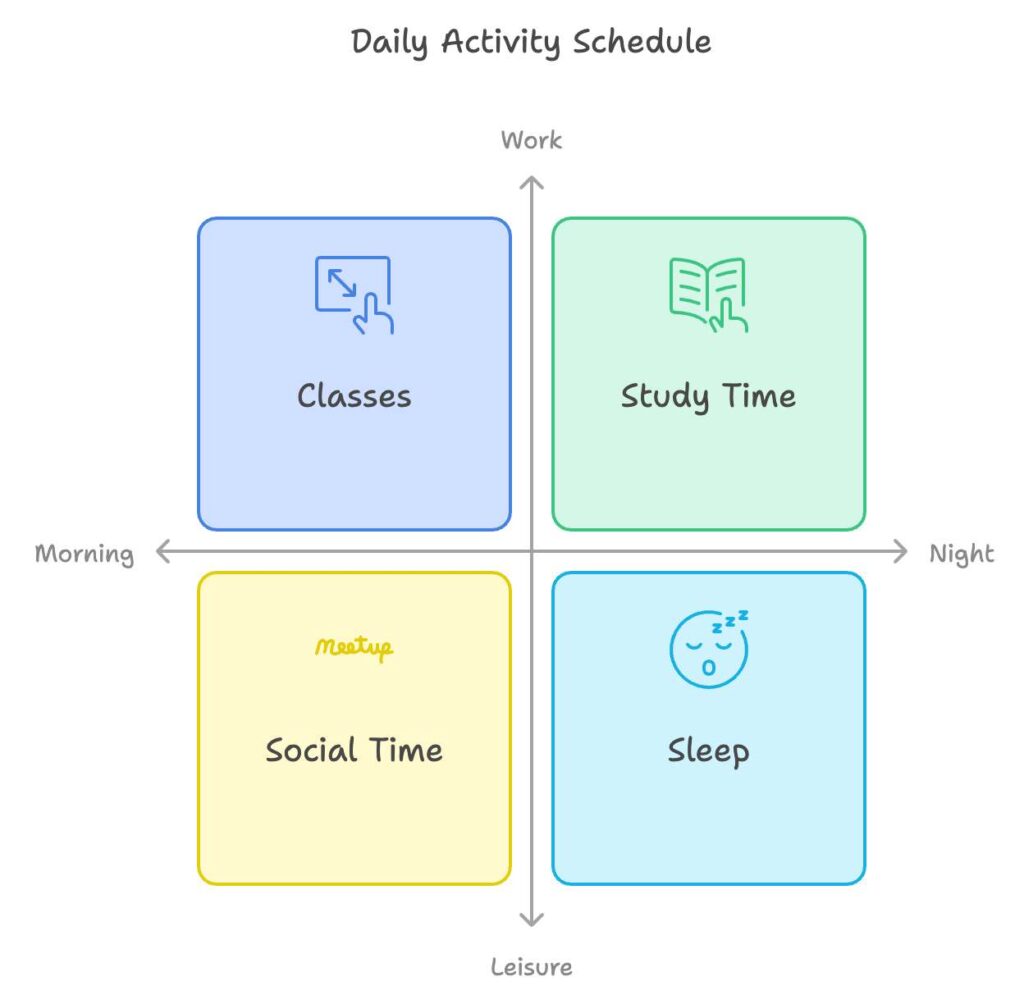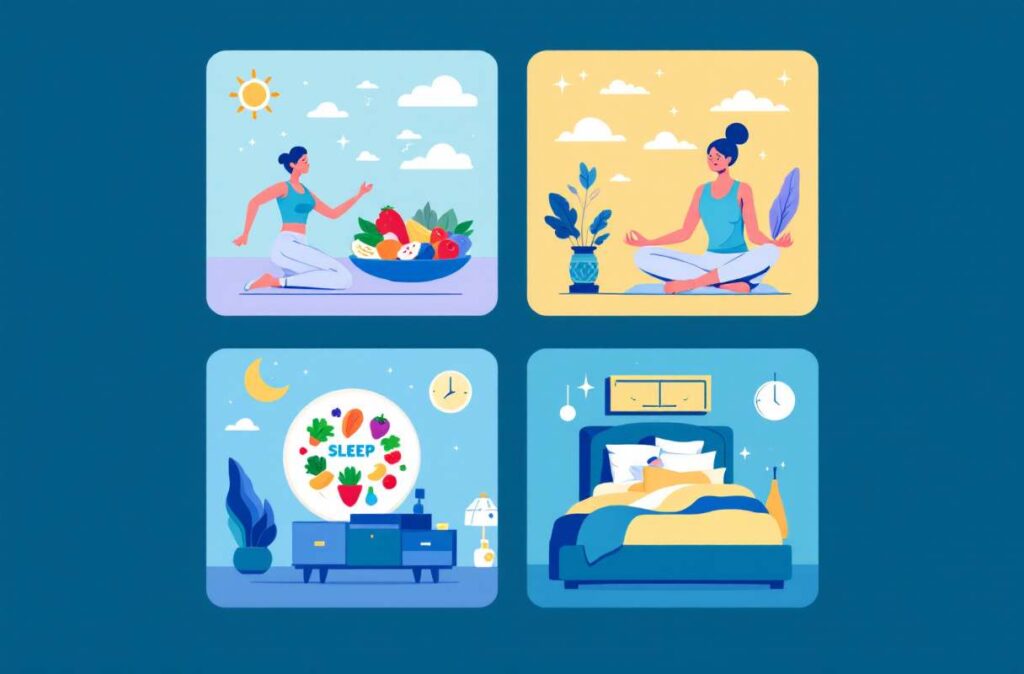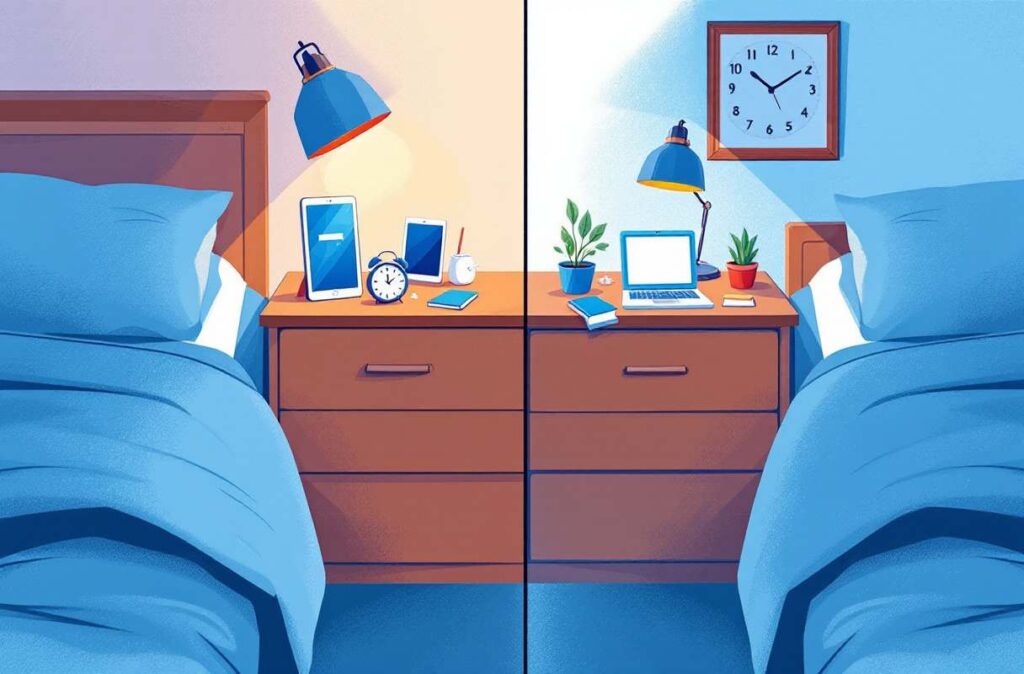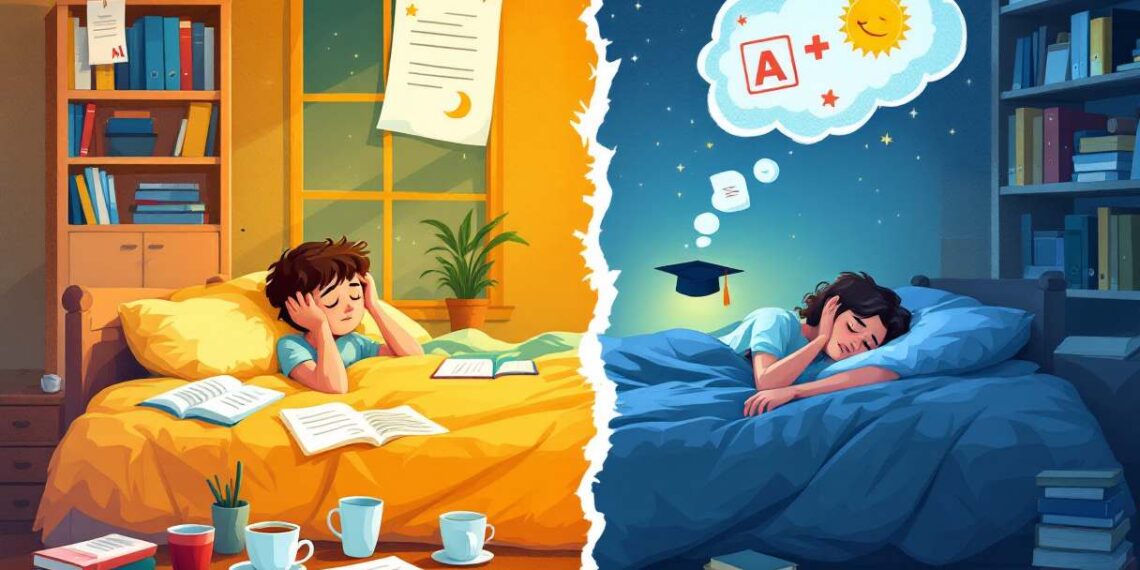Picture this: It’s 2 AM, you’re on your fifth cup of coffee, surrounded by a fortress of textbooks, and your eyelids feel heavier than your backpack on the first day of classes. Sound familiar? Welcome to the sleep-deprived world of college life, where all-nighters are worn like badges of honor, and sleep is treated like a luxury reserved for weekends and winter break. But what if we told you that catching those elusive Z’s could be the secret weapon to acing your classes, boosting your GPA, and actually enjoying your college experience? Forget the “sleep when you’re dead” mantra – it’s time to embrace the power of quality shut-eye. In this guide, we’re diving into the magical realm of sleep and how it can transform your college journey from a bleary-eyed struggle to a wide-awake success story. So grab your coziest blanket, fluff up that pillow, and let’s explore why sleep might just be the most important course you take in college.
Importance of Quality Sleep for College Success
Understanding How Snoozing Boosts Your Grades
Getting enough shut-eye is key to attending college. Skimping on sleep can mess with your brainpower, memory, and grades – not exactly a surprise party, right? Between lectures, homework marathons, and hanging out with friends till the morning, many students end up putting sleep on the back burner. Yet, catching those Z’s can supercharge their college journey.
“Sleep is that golden chain that ties health and our bodies together.” – Thomas Dekker
When sleep falls by the wayside, your brain doesn’t take kindly to it. Fuzzy concentration and iffy judgment skills are just the beginning. Here’s a quick rundown of how skipping sleep messes with your classroom mojo:
| Sleepless Side Effects | School Slump |
|---|---|
| Nodding off in class | Shrinking participation grades |
| Memory goes on strike | Struggling with test questions |
| Sluggish thinking | Goofing up more assignments |
| Stress levels go sky-high | Dropping satisfaction like a hot potato |
To keep your grades—and sanity—intact, try squeezing in a solid 7 to 9 hours each night. Experts say this snooze range is your ticket to not only higher GPAs but also a happier vibe.
Peaceful sleeping habits can save your bacon when school stress tries to knock you over. Think cozying up your bed zone or crafting a wind-down routine before lights out. Families fretting over the sleep habits of their college-bound kiddo can dig into more pointers in articles about teenage sleep deprivation and how to improve sleep naturally.
So, let’s give nap time the credit it’s due because quality sleep might just be the secret sauce to transforming those stressful classes into a rewarding college adventure.

Establishing a Healthy Sleep Routine
Getting into a groove with sleep is a secret weapon for college students wanting to crush those exams. Sticking with it keeps your body ticking like a fine-tuned clock, making you sharp and ready for anything.
Setting a Consistent Sleep Schedule
Regular sleep? Yeah, it’s like magic for waking up not feeling like a zombie! College life is all about juggling classes and social plans, which makes bedtime a moving target. Yet, hitting the sack and getting up around the same time every day can seriously amp up your Z’s.
Here’s a trusty schedule for catching those much-needed snoozes:
| Day | Bedtime | Wake Time | Recommended Hours of Sleep |
|---|---|---|---|
| Sunday | 11:00 PM | 7:00 AM | 8 hours |
| Monday | 11:00 PM | 7:00 AM | 8 hours |
| Tuesday | 11:00 PM | 7:00 AM | 8 hours |
| Wednesday | 11:00 PM | 7:00 AM | 8 hours |
| Thursday | 11:00 PM | 7:00 AM | 8 hours |
| Friday | 12:00 AM | 8:00 AM | 8 hours |
| Saturday | 12:00 AM | 8:00 AM | 8 hours |
This kind of routine nudges your body into dreaming land more smoothly. For more tips on dialing in that sleep schedule, have a peek at our article on adjusting sleep schedules.
Creating a Relaxing Bedtime Routine
Bedtime should be all about chilling out and telling your body, “Hey, it’s shut-eye time!” Little habits can make this shift from the day’s hustle much smoother. Here’s how to make it happen:
- Reading a Book: Pick something fun and easy. Let your brain unplug!
- Meditation or Breathing: A few minutes to focus on breathing can shave off stress and help you zen out.
- Warm Bath or Shower: It’s not just about getting clean—it’s like a mini spa retreat.
- Limit Screens: Say “see ya” to screens at least 30 minutes before bed to dodge that blue light party. We dive into this more in our screen time and sleep post.
Pairing a chilled-out night routine with a sleep schedule is like the one-two punch for better snoozing. Students, try messing around with different methods to see what gets you your best downtime—and boost your brainpower along the way!
Optimizing Your Sleep Setup
Getting a good night’s rest isn’t just about caffeine-free nights; it’s about creating a sleep zone that’s more inviting than a cat’s napping spot. Especially for college students, who might confuse a bed for a second desk, optimizing this space can seriously up the sleep game. Get ready to curate your own slice of nap heaven.
Designing a Dreamy Sleep Haven
Nothing beats crashing in a snug bed after a long day, and setting up a comfy sleep area is the first step. Focus on your bed, the room’s vibe, and don’t skimp on coziness.
| Aspect | Tips to Snooze By |
|---|---|
| Mattress Type | Opt for a snug yet supportive mattress. Memory foam and hybrids are the current faves. |
| Bedding | Go for sheets and quilts that breathe, like cotton or linen. Keeps you cozy, not sweaty. |
| Pillow | Pick the right height and squishiness to keep your neck happy and aligned. |
| Room Temperature | Keep your chill on, with the room between 60-67°F (15-19°C). Cool is the rule. |
Add some chill colors and ditch the clutter to make your rest nook the place dreams are made of (literally).
Keeping Noise and Light at Bay
Sound and light are the arch-nemeses of sleep. Get on top of these sneaky wreckers to snag the best shut-eye.
| Annoyance | How to Chill Out |
|---|---|
| Noise | Earplugs or a white noise machine can be your best sleep buddy. A gentle hum can be super calming. |
| Light | Think blackout curtains to keep out unwelcome light intrusions. Dim those bulbs at night to tell your brain it’s downtime. |
| Screen Time | Give screens the boot an hour before bed. They’re total melatonin killers. Discover more in our screen time and sleep piece. |
Whether you’re a sleep-seeking student or a concerned caregiver, tweaking these elements can up your sleep quality and daily mojo. For more on catching some quality Z’s at various life stages, check out our takes on teenage sleep deprivation and improve sleep naturally.
Healthy Habits for Better Sleep
College life can be a whirlwind, making sleep a precious commodity. But take heart, because some practical changes can have you snoozing like a pro! Working in a bit of exercise and watching what you eat can set the stage for those good nights’ rests you’ve been dreaming about.

Regular Exercise and Physical Activity
Getting the body moving isn’t just about fitting into those jeans—it’s your ticket to sleep town! When the day’s sweat session lowers stress and anxiety levels, drifting off to dreamland becomes a breeze. And here’s the bonus: exercise might just boost that deep, restorative sleep we all crave.
Here’s a peek at how much you should be moving to rock your sleep game:
| Age Group | Recommended Exercise per Week |
|---|---|
| Young Adults (18-25) | 150 minutes of moderate activity or 75 minutes of breaking a sweat vigorously |
| Teens (14-17) | 60 minutes a day—make it count with a mix of fun and fitness |
| Middle-Aged Adults (26-55) | Same as the young crowd—exercise isn’t just for spring chickens! |
| Seniors (56+) | Keep it moderate but strong—as good as a cup of warm chamomile |
Find what gets you going—a quick jaunt around campus, a pickup game with friends, or striking a pose or two in yoga. It’s about finding your groove and sticking to it for that sweet, sweet sleep.
Mindful Eating Habits
Munch, munch—what you chow down matters more than you think! Being mindful about food means tuning into your hunger vibes and choosing wisely, especially if you want to catch some solid Z’s.
Check out what helps or hampers you when you hit the hay:
| Foods to Help You Snooze | Foods to Dodge |
|---|---|
| Almonds | Anything caffeine-laden (goodbye post-dinner cappuccino) |
| Oats | Sugary temptations |
| Turkey (good ol’ tryptophan) | Heavy duty, belly-busting meals |
| Bananas | Too much spice and sassiness |
| Salmon and other fatty fish | Last-call alcohol runs |
Chow down on whole grains, vibrant veggies, juicy fruits, light proteins, and healthy fats for a sleep-friendly diet. Keep those late-night snacks light and the caffeine at bay as you get closer to bed. Wanna know more about how your screen time and food choices affect sleep? We’ve got a deep dive on that in our screen time and sleep article.
Sprinkle in some exercise and a dash of smart eating to power up both your grades and your night’s rest. Go on, give it a whirl, and find yourself waking up refreshed and ready to take on the day!
Managing Stress and Anxiety
College is like a roller coaster – thrilling but with a good chance of leaving you nauseous from the twists and turns. Balancing classes, a mountain of assignments, and whatever social life you can squeeze in can crank up stress and anxiety, often throwing sleep quality out the window. Picking up some ways to chill out and handle the pressure can make a world of difference in catching some Z’s.
Effective Stress-Bustin’ Moves
When life’s got you ready to pull your hair out, try these simple steps to kick stress to the curb. Folks swear by these tricks for a reason:
| Technique | What It’s About |
|---|---|
| Deep Breathing | Slow, deep breaths are where it’s at for calming down. |
| Meditation and Mindfulness | Get mindful with meditation. It’s like giving your brain a spa day. |
| Journaling | Put your thoughts on paper, and clear out your mental junk drawer. |
| Time Management | Keep your chaos in check by organizing what’s urgent and what’s not. |
| Social Support | Chat with your peeps for some good ol’ emotional backup. |
Sticking to these can sprinkle some calm into your life, which might just help you sleep like a baby. Curious for more? Peep our article on improve sleep naturally.
Tricks for Tackling Academic Stress
College pressure is a rite of passage, and everyone’s got their battle stories. Here’s how to fight back:
| Strategy | What It’s About |
|---|---|
| Set Realistic Goals | Eat the elephant one bite at a time—a.k.a. break it on down. |
| Regular Breaks | Give yourself a timeout when deep in the study zone. |
| Healthy Study Habits | Amp your study game with methods that stick. |
| Seek Guidance | Phone a friend… or a professor if things get too real. |
| Build a Study Group | Tag-team your studies for double the brainpower. |
Using these game plans, students might just dodge the stress wave, leading to a smoother sailing when it comes to workload. On top of feeling more mentally fit, there’s a good sleep at the end of this rainbow. Wanna know more? Hop over to our posts on teenage sleep deprivation and how screen time can mess up your sleep.
Technology and Sleep
Tech’s everywhere and it’s messing with how college students catch their Z’s. Figuring out how to deal with our devices could mean better snooze-time and healthier vibes.

Limiting Screen Time Before Bed
Before you hit the hay, ditch the gadgets! The blue glow from screens — be it phones, tablets, or computers — ain’t doing your sleep any favors. This blue light throws a wrench in the works of melatonin, the sleep hormone. So, the experts (you know, the folks in lab coats and all) say, keep those screens away to snooze like a champ. Here’s a quick look at when to cut off your screen time:
| Suggested Chill Period | Who’s Who |
|---|---|
| 1-2 hours | College Peeps |
| 30 minutes | Kiddos |
| 1 hour | Teenagers in Training |
Unplugging before you conk out helps hit the off button on stress, making room for healthier snooze rituals. Curious about how your iPhone might be causing sleep drama? Check out more on screen time and sleep.
Utilizing Sleep-Tracking Apps and Tools
Want more Z’s? Check out sleep-tracking apps! These nifty gadgets tell you the deets of your sleep cycles, how long you actually slept, and the quality of your snooze.
| App Coolness | What You Get |
|---|---|
| Sleep Cycle Spy | Cracks the code on your nightly rhythms |
| Smart Alarms | Yanks you from dreamland without the rage, thanks to light-sleep wake-ups |
| Sleep Stats Galore | Dishes out the 411 on how boss (or not) your sleep game is |
Getting techy about your rest can be a game-changer for college students. By seeing the whole sleep pic, you can tweak your routines for smoother nights. Need more on getting dreamy at different ages? Check out teenage sleep deprivation or improve sleep naturally.
Getting a Hand When You Need It
When the sandman is playing hard to get, college students should know it’s smart to seek help. There’s a bunch of lifelines out there ready to keep those zzz’s in check and your grades glistening.
On-Campus Sleep-Aid Spots
Colleges are loaded with options for wrangling sleep issues and keeping you balanced. Check these out:
| Lifeline | What They Do |
|---|---|
| Counseling Center | Got experts to untangle stress, anxiety, and sleep snags. |
| Health Services | Offers workshops, tips on sleep hygiene, and maybe even screens for sleep disorders. |
| Academic Success Programs | Doles out wisdom on juggling work and catching enough shut-eye. |
Don’t sleep on these resources—they’re your ticket to mastering sleep and acing school. Curious about how sleep shakes up your brainpower? Peek at our sleep and cognitive health guide.
Why Professional Help Matters
If you’ve tried counting sheep and it’s still game over, ringing up the pros might be the answer. They can dig into any sneaky issues like sleep disorders.
Got sleep gremlins? Here are a few that might need pro attention:
| Issue | What It Means |
|---|---|
| Chronic Insomnia | You’re tossing and turning a lot and it’s messing with your life. |
| Sleep Apnea | Breathing’s all wonky at night, probably needs a doctor’s touch. |
| Monster Anxiety or Sadness | These emotional rollercoasters can wreck your sleep, sometimes needing counseling or meds. |
Giving a boost to your mental and physical well-being can turbocharge your brainwork. Want to know more about the sleep struggles teens face? Our teenage sleep deprivation write-up breaks it down.
Power Naps and Sleep Hygiene
Life in college ain’t easy, juggling classes, social stuff, and maybe a job on the side. Lucky for you, power naps and decent sleep hygiene could be your secret weapons for staying on top of everything.
Why Power Naps Are Awesome
Power naps might just be a college student’s best friend. Done right, they pack a punch and help you recharge. Here’s why embracing them can be a game-changer:
| Benefit | What’s In It For You |
|---|---|
| Instant Energy Boost | A quick snooze can work wonders against midday slumps and help you power through late-night cram sessions. |
| Brain Power-Up | Quick naps can help cement stuff you’ve crammed into your brain, making sure it sticks around for tests or assignments. |
| Mood Magic | Catching a few Z’s can lift your spirits, easing stress and keeping you chill—especially useful when finals loom large. |
| Smarts and Sparks | Grabbing some shut-eye can jazz up your problem-solving skills and get your creative juices flowing. |
Aim for catnaps of 20-30 minutes to dodge that groggy “where am I?” post-nap haze.
Nailing Sleep Hygiene
Sleep hygiene ain’t about washing your sheets (though that’s nice, too). It’s doing the right stuff to get quality shut-eye. Here’s how college peeps can nail it:
| Habit | Why It Matters |
|---|---|
| Steady Sleep Routine | Hitting the sack and rising with the sun at the same time every day helps your body get into a groove. |
| Cozy Sleep Space | Create a snooze-friendly zone with a comfy bed, right room temp, and lights down low. |
| Caffeine & Sugar Slimdown | Cut back on both in the afternoon and evening to help your body wind down when it’s bedtime. |
| Chill-Out Sessions | Unwind with activities like reading or yoga; they can help get your mind ready to switch off. |
| Ditch the Screens | Back off the phones and tablets an hour before sleep to help your body know it’s bedtime. Curious about how screens mess with your Z’s? Check out our post on screen time and sleep. |
With short snoozes and smart sleep habits, college life can seem less like sleepwalking and more like winning. Curious about sleep dilemmas teenagers face? Peek at our article on teenage sleep deprivation.
Conclusion
As we close the book on our sleep-filled journey, it’s clear that quality shut-eye isn’t just a luxury – it’s your secret weapon for conquering college life. From boosting your brain power and grades to keeping stress at bay and your mood in check, sleep is the unsung hero of your academic adventure. Remember, creating a sleep sanctuary in your dorm room, sticking to a consistent sleep schedule (yes, even on weekends!), and embracing the power of the power nap can transform your college experience from a caffeine-fueled marathon to a well-rested sprint toward success. So the next time you’re tempted to pull an all-nighter or scroll through TikTok until the wee hours, think about the sleep-savvy student you’re becoming. Your future self – the one acing exams, crushing presentations, and actually enjoying college life – will thank you for prioritizing those precious Z’s. After all, in the grand syllabus of life, mastering the art of quality sleep might just be the most important lesson you learn in college. Sweet dreams, and here’s to waking up to your full potential!
FAQs
How much sleep do college students really need?
Most college students need 7-9 hours of sleep per night for optimal cognitive function and overall health. However, individual needs may vary slightly.
Can naps make up for lost nighttime sleep?
While short power naps (20-30 minutes) can provide a quick boost, they don’t fully compensate for inadequate nighttime sleep. Consistent, quality nighttime sleep is crucial for long-term health and academic performance.
How does alcohol affect sleep quality?
Although alcohol might help you fall asleep faster, it disrupts your sleep cycle, particularly REM sleep. This leads to less restful sleep and can impact cognitive function the next day.
Is it better to sleep or study more before an exam?
In most cases, getting a full night’s sleep before an exam is more beneficial than pulling an all-nighter to study. Sleep helps consolidate memories and improves cognitive function, which can lead to better exam performance.
How can I improve my sleep environment in a noisy dorm?
Try using earplugs or a white noise machine to mask disruptive sounds. Invest in a sleep mask to block out light, and talk to your roommates about establishing quiet hours
Additional resources
- National Sleep Foundation: “Healthy Sleep Tips” – https://www.sleepfoundation.org/articles/healthy-sleep-tips
- American Academy of Sleep Medicine: “Healthy Sleep Habits” – https://sleepeducation.org/healthy-sleep/healthy-sleep-habits/
- Harvard Health Publishing: “Importance of Sleep : Six reasons not to scrimp on sleep” – https://www.health.harvard.edu/press_releases/importance_of_sleep_and_health
- Sleep.org: “How Sleep Affects Memory” – https://www.sleep.org/articles/sleep-affects-memory/
- Centers for Disease Control and Prevention: “Sleep and Sleep Disorders” – https://www.cdc.gov/sleep/index.html








